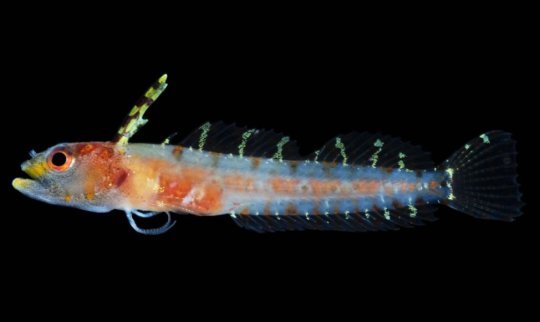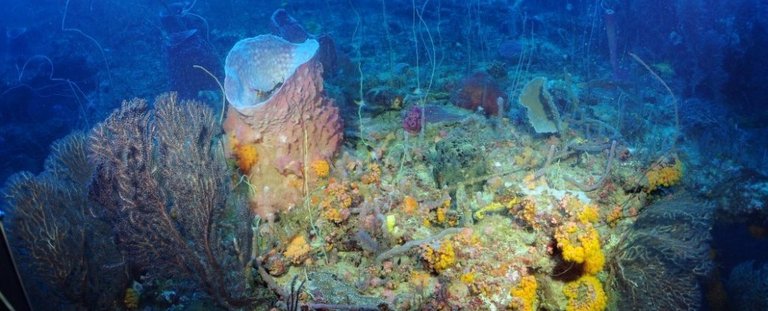
"It's estimated that 95 percent of the livable space on our planet is in the ocean. Yet only a fraction of that space has been explored." - Carole Baldwin, curator of fishes at the Smithsonian's National Museum of Natural History Source
It is no secret that a significant portion of our oceans remains completely unknown, potentially harboring thousands of species not recognized by science. Most of these regions are thousands of miles from the nearest shore, and can be miles deep, making them incredibly difficult for even the most advanced submersibles to survey. However, a newly-defined oceanic zone has been officially named, and unlike the mysterious deep, this zone lies just below some of the most popular reefs in the world!

Shallow coral reefs are one of the most heavily surveyed aquatic ecosystems. They harbor a massive portion of all marine life, with hundreds of thousands of species relying on them for food, shelter, migration way points and breeding. Unfortunately, these critically important ecosystems are in decline, with warmer waters and ocean acidification wiping out out entire reefs around the world. The declining health of these reefs prompted Smithsonian researchers to begin looking deeper within these reefs; they began wondering if the deeper portions of these reefs (occasionally called the "coral reef twilight zone") might harbor organisms from the threatened shallow reefs above them. As they dove deeper, they realized that we have only just scratched the surface of reef biodiversity.
Using a submersible, biologists dove deeper into a southern Caribbean reef system in Curaçao, well below the range of normal divers. There they discovered an almost new world among a familiar reef, a zone that they named the rariphotic zone, where light is very limited (between depths of 130 and 300 metres [400 and 1,000 feet]). This zone lies just below the mesophotic (medium light) zone, and though it is only a couple hundred feet below the shallow reef, it harbors an incredible number of previously unknown species!

"About one in every five fish we're finding in the rariphotic of the Caribbean is a new species." -D. Ross Robertson, marine biologist at STRI Source
Over the course of about 80 dives, biologists have discovered 71 previously unknown species on a single reef. Interestingly, these fish not only resemble the fish living on shallower portions of the reef, they are also closely related, unlike most deep water fish which have taken a very different evolutionary path. This has given biologists some hope that, as shallow reefs decline, some of their species will find refuge among the deeper reefs, however further observation is required.
"Reef ecosystems just below the mesophotic are globally underexplored, and the conventional view based on the few studies that mention them was that mesophotic ecosystems transition directly into those of the deep sea. Our study reveals a previously unrecognized zone comprising reef vs. deep-sea fishes that links mesophotic and deep-sea ecosystems." -Baldwin Source

Article Link: https://www.sciencedaily.com/

Our oceans are clearly a big mystery for us.
I remember a famous phrase (although I was never sure if it was correct) that we knew more about the surface of the moon, than about the depths of the ocean.
I think discoveries like this one will continue to happen years and even decades down the road.
I'd say it's true. Not only due to the sheer size and depth of the ocean, but we have to understand the entire ecosystem of the ocean, and there is probably a huge number of organisms we haven't discovered yet.
Very cool. Not sure how many species would realistically be able to transition to greater depth but it's fascinating that so many of them are already present and that so many unknown species are cropping up...
I go back and forth on that. Some fish are pretty tolerant of depth change (to a degree) and move up and down in the water column looking for food. But yeah, if they are adapted to the shallow reef waters, that could be a challenge, especially at the rate reefs are disappearing.
This one really piqued my interest. I've just learnt something new. This has also buttressed the fact that life began at the bottom of the sea.
Nice piece
So this brings us to... 15 named oceanic biomes now?
One thing I like to ask people to illustrate our relative ignorance about the oceans is to estimate the percent of their bookshelves are filled with books about the ocean. The world's mostly ocean, and most people have maybe a couple of books about the ocean on them- usually fiction, at that.
good
Capture them and imprison them in small bowls.
The fact that we have only explored less than 5 % of the ocean makes me wonder how much mysteries mother nature has in store for us. :o
Being A SteemStem Member
Still so much to discover... But already so much destroyed. Arf, I don't want to be too pessimistic. The Anthias asperilinguis looks really funky. :) I want to see the 74 other species!
What I call my attention most of your post, is that the underwater photos are very similar to ones I took doing snorkelin (obvious only looks in the beautiful coral, fish and of course, water haha) but it is certainly a very interesting. I agree with what you say, however I would like all these species to remain hidden from us, it is no secret to anyone that humans are the most destructive race in the world, and in our ambition for knowledge and power ending up damaging everything. I believe that, if there are millions of magnificent beings, they do well to hide from us.
Think, how many beautiful animals have not been extinct because of man's ambition? How many lakes, beaches and rivers have not been contaminated? How many animals are not tortured for scientific purposes?
I know that maybe I sound a little rude, but it is my point of view, however I enjoyed your post very much. By the way, if it's not too much trouble I wanted to invite you to read my posts. I would greatly appreciate if you take the time to read them, and in case you like them, I would appreciate it if you would give me a vote, a comment, or a resteem.
You have my vote, and I stay attentive to your next publications!
Congratulations @herpetologyguy! You have completed some achievement on Steemit and have been rewarded with new badge(s) :
Click on any badge to view your own Board of Honor on SteemitBoard.
For more information about SteemitBoard, click here
If you no longer want to receive notifications, reply to this comment with the word
STOP